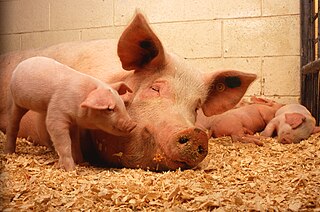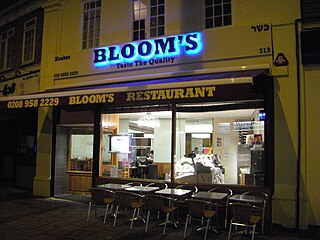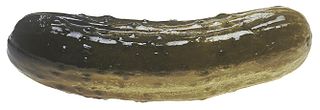Kashrut is a set of dietary laws dealing with the foods that Jewish people are permitted to eat and how those foods must be prepared according to Jewish law. Food that may be consumed is deemed kosher, from the Ashkenazi pronunciation of the term that in Sephardic or Modern Hebrew is pronounced kashér, meaning "fit".

A mashgiach or mashgicha is a Jew who supervises the kashrut status of a kosher establishment. Mashgichim may supervise any type of food service establishment, including slaughterhouses, food manufacturers, hotels, caterers, nursing homes, restaurants, butchers, groceries, or cooperatives. Mashgichim usually work as on-site supervisors and inspectors, representing a kosher certification agency or a local rabbi, who actually makes the policy decisions for what is or is not acceptably kosher. Sometimes certifying rabbis act as their own mashgichim; such is the case in many small communities.
Kosher foods are foods that conform to the Jewish dietary regulations of kashrut. The laws of kashrut apply to food derived from living creatures and kosher foods are restricted to certain types of mammals, birds and fish meeting specific criteria; the flesh of any animals that do not meet these criteria is forbidden by the dietary laws. Furthermore, kosher mammals and birds must be slaughtered according to a process known as shechita and their blood may never be consumed and must be removed from the meat by a process of salting and soaking in water for the meat to be permissible for use. All plant-based products, including fruits, vegetables, grains, herbs and spices, are intrinsically kosher, although certain produce grown in the Land of Israel is subjected to other requirements, such as tithing, before it may be consumed.

Jewish cuisine refers to the worldwide cooking traditions of the Jewish people. During its evolution over the course of many centuries, it has been shaped by Jewish dietary laws (kashrut), Jewish festivals and holidays, and traditions centred around Shabbat. Jewish cuisine is influenced by the economics, agriculture, and culinary traditions of the many countries where Jewish communities have settled and varies widely throughout the entire world.

Kosher salt or kitchen salt is coarse edible salt without common additives such as iodine, typically used in cooking and not at the table. It consists mainly of sodium chloride and may include anticaking agents.

Pork is a food taboo among Jews, Muslims, and some Christian denominations. Swine were prohibited in ancient Syria and Phoenicia, and the pig and its flesh represented a taboo observed, Strabo noted, at Comana in Pontus. A lost poem of Hermesianax, reported centuries later by the traveller Pausanias, reported an etiological myth of Attis destroyed by a supernatural boar to account for the fact that "in consequence of these events the Galatians who inhabit Pessinous do not touch pork". In Abrahamic religions, eating pig flesh is clearly forbidden by Jewish (kashrut), Islamic (halal) and Adventist dietary laws.

Kishka or kishke refers to various types of sausage or stuffed intestine with a filling made from a combination of meat and meal, often grain or potato. The dish is popular across Eastern Europe as well as with immigrant communities from those areas. It is also eaten by Ashkenazi Jews who prepare their version according to kashrut dietary laws.

Kosher style refers to foods commonly associated with Jewish cuisine but which may or may not actually be kosher. It is a stylistic designation rather than one based on the laws of kashrut. Generally, kosher-style food does not include meat from forbidden animals, such as pigs and shellfish, and does not contain both meat and milk in the same dish; however if such dish includes meat, it might not be kosher slaughtered. In some U.S. states, the use of this term in advertising is illegal as a misleading term under consumer protection laws.
The Islamic dietary laws (halal) and the Jewish dietary laws are both quite detailed, and contain both points of similarity and discord. Both are the dietary laws and described in distinct religious texts: an explanation of the Islamic code of law found in the Quran and Sunnah and the Jewish code of laws found in the Torah, Talmud and Shulchan Aruch.

A kosher restaurant or kosher deli is an establishment that serves food that complies with Jewish dietary laws (kashrut). These businesses, which also include diners, cafés, pizzerias, fast food, and cafeterias, and are frequently in listings together with kosher bakeries, butchers, caterers, and other similar places, differ from kosher-style businesses in that they operate under rabbinical supervision, which requires that the laws of kashrut, as well as certain other Jewish laws, including the separation of meat and dairy must be observed.
Civil laws regarding kashrut are found in several countries. Advertising standards laws in many jurisdictions prohibit the use of the phrase "kosher" in a product's labelling, unless it can be shown that the product conforms to Jewish dietary laws; however, the legal qualifications for conforming to Jewish dietary laws are often defined differently in different jurisdictions.

A pickled cucumber – commonly known as a pickle in the United States and Canada and a gherkin in Britain, Ireland, South Africa, Australia, and New Zealand – is a usually small or miniature cucumber that has been pickled in a brine, vinegar, or other solution and left to ferment. The fermentation process is executed either by immersing the cucumbers in an acidic solution or through souring by lacto-fermentation. Pickled cucumbers are often part of mixed pickles.
The Tav HaYosher is a certification mark offered, free of charge, to Kosher food establishments that meet a series of ethical criteria developed by the organization, Uri L'Tzedek. Particularly, the Tav HaYosher confirms that an eating establishment with its seal pays minimum wage to all employees and overtime to those employees working more than 40 hours a week. It also ensures the establishment offers employees appropriate breaks as required by law, and provides a safe and abuse-free working environment.

Montreal-style smoked meat, Montreal smoked meat or simply smoked meat in Quebec is a type of kosher-style deli meat product made by salting and curing beef brisket with spices. The brisket is allowed to absorb the flavours over a week. It is then hot smoked to cook through, and finally is steamed to completion. This is a variation on corned beef and is similar to pastrami.
The Jewish-American patronage of Chinese restaurants became prominent in the 20th century, especially among Jewish New Yorkers. It has received attention as a paradoxical form of assimilation by embracing an unfamiliar cuisine that eased the consumption of non-kosher foods.

American Jewish cuisine comprises the food, cooking, and dining customs associated with American Jews. It was heavily influenced by the cuisine of Jewish immigrants who came to the United States from Eastern Europe around the turn of the 20th century. It was further developed in unique ways by the immigrants and their descendants, especially in New York City and other large metropolitan areas of the northeastern U.S.
Ethiopian Jewish cuisine is the cuisine of the Beta Israel. The cuisine of the Ethiopian Jews is similar to the cuisine of other Ethiopians, with some variations.









